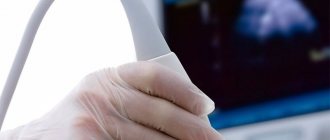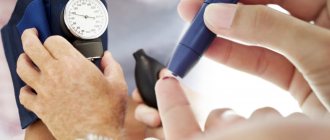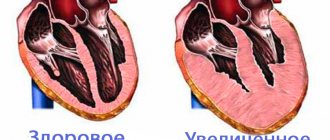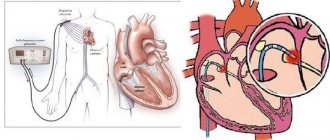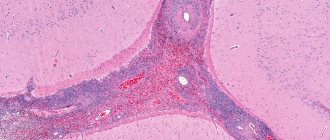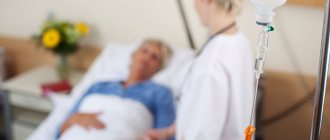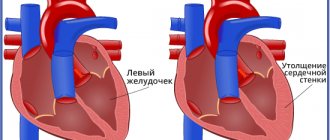Hypertension develops when the regulation of blood circulation is disrupted. One of the main reasons for malfunctioning of the cardiovascular system in old age is weakness and fragility of blood vessels. When elasticity decreases, they can no longer fully perform their functions. As a result, the intensity of blood flow is disrupted and a persistent increase in blood pressure (BP) occurs.
In old age, increased blood pressure if left untreated often leads to a hypertensive crisis. The consequences of this complication can be myocardial infarction, acute cardiovascular failure, stroke, renal failure, and the development of dementia. To prevent dangerous complications, it is necessary to seek medical help for any deviations in blood pressure from the norm.
Hypertension in the elderly: what are the causes of the pathology?
Pressure increases during physical activity, changes in temperature and humidity, and in stressful situations. Such episodic fluctuations are normal for the body. A threefold increase in blood pressure above 140/90 mm Hg is considered a deviation. Art.
Increased pressure can be caused by various reasons and factors. In old age it is:
- diseases of the endocrine system;
- pathology of the kidneys, adrenal glands;
- disturbances in the functioning of the nervous system;
- atherosclerosis;
- obesity;
- metabolic disease;
- poor nutrition;
- low physical activity.
There are often cases when older people with hypertension feel well and do not experience any discomfort. Signs of the disease may not appear for a long time, so periodic monitoring of blood pressure is necessary.
Healthcare Institution "Myadel Central District Hospital"
Registration of the clinic - 8 017 97 24-3-89 Registration of the pediatric department of the clinic - 8 017 97 24-3-15 Reception of the chief physician (fax) - 8 017 97 24-3-80 Myadel emergency medical department of the Medical Institution "MotssMP" - 103 " _ _ _ _ hotline" - 8 017 97 22-3-21 Questions on the provision of medical care during the period of rising incidence of viral infections - 8 017 97 24-3-88 Tasks and functions: Public health is one of the main conditions for the successful implementation of the socio-economic development strategy The Republic of Belarus. The most important goal of the state in the field of health protection is to reduce the level of diseases, the spread of which poses a major threat to the health of citizens and national security. The main task of domestic healthcare is to preserve the principles of social equality in the provision of medical care. The Republic of Belarus has developed a legislative framework , which, among other things, establishes the equal right of citizens to affordable medical care. The fundamental documents are: - The Constitution of the Republic of Belarus (Article 45); — Law of the Republic of Belarus “On Health Care”; — Law of the Republic of Belarus “On State Minimum Social Standards”; The Constitution of the Republic of Belarus guarantees citizens of the country the right to health care, including free treatment in state health care institutions (Article 45). In accordance with the Law of the Republic of Belarus “On Health Care”, citizens of the Republic of Belarus have the right to affordable health care , which is ensured by: - the provision of free medical care in state health care institutions based on state minimum social standards in the field of health care; — provision of medical care in state health care organizations, non-state health care organizations and individual entrepreneurs at the expense of their own funds, funds of legal entities and other sources not prohibited by the legislation of the Republic of Belarus. The Law “On State Minimum Social Standards” establishes state minimum social standards in the field of healthcare (adopted by regional (Minsk City) Councils of Deputies for each region).
Tasks and functions of the Myadel Central District Hospital: - Implementation of a set of measures developed on the basis of the Law of the Republic of Belarus “On Health Care”, Decrees of the President of the Republic of Belarus, Decrees of the Government and the Ministry of Health of the Republic of Belarus, aimed at creating conditions for preserving and strengthening the health of the population of the region. — Ensuring accessibility of medical care for the population of the region, providing free medical care based on state minimum social standards in the field of healthcare. — Providing the population of the region with highly qualified inpatient and outpatient medical care. — Development and implementation of measures aimed at improving the quality of medical care for the population of the region, reducing morbidity, disability, hospital mortality, child and general mortality and improving the health of children, adolescents and women. — Timely and widespread introduction of modern methods and means of prevention, diagnosis, treatment and rehabilitation into the practice of all treatment and prevention organizations in the region. — Development, organization and implementation of measures for the deployment, rational use, professional development and education of medical personnel. — Operational, organizational and methodological management, as well as control over the work of all healthcare organizations in the district. — Priority development of primary health care. — Interaction and continuity with other healthcare institutions. — Implementation of government programs in the field of healthcare. — Carrying out work on hygienic education of the population and the formation of a healthy lifestyle. — Introduction of economic forms of management and increasing the efficiency of using allocated financial resources. — Improving and strengthening the material and technical base.
Objectives of the Myadel Central District Hospital: - Providing qualified, specialized medical care to the population of the entire region. — Implementation of operational, organizational and methodological management of rural treatment and preventive organizations. — Advisory assistance. — Planning and forecasting of health care in the region. — Monitoring the activities of health care organizations in the region. — Financing. Identification of economic priorities. — Supply of medical equipment and equipment. — Introduction of modern methods of prevention, diagnosis, treatment, rehabilitation and recovery. — Drawing up summary statistical reports. — Organization and implementation of preventive measures.
Tasks of a medical outpatient clinic: - Conducting appointments and providing care to patients at home. — Providing first aid for acute diseases and accidents (injuries, poisoning, etc.). — Ensuring the patient is referred to other medical facilities in accordance with medical indications. — Early detection of diseases, timely outpatient examination and treatment of patients. — Identification of patients in need of inpatient treatment and preparing them for hospitalization. — Ensuring continuity in examination and treatment with the hospital, emergency department of the Central District Hospital. — Work on the examination of temporary disability and issuance of certificates of incapacity for work. — Referral in the prescribed manner of persons with disabilities to VKK. — Conducting preventive medical examinations of persons subject to examination in the prescribed manner. — Clinical examination of the population: timely registration of persons subject to medical examination (patients and healthy people), ensuring dynamic monitoring of their health status, carrying out therapeutic and recreational activities. — Preferential provision of medical care to individual agricultural workers (machine operators, etc.). — Carrying out measures to provide medical care to agricultural workers during the period of mass field work. — Protecting the health of mothers and children. — Carrying out a set of sanitary and anti-epidemic measures (preventive vaccinations, etc.). — Notification of the district center of hygiene and epidemiology in the prescribed manner about infectious, parasitic and occupational diseases, poisoning of the population and identified violations of sanitary and hygienic requirements. — Carrying out sanitary education work. — Scheduled visits of doctors to assigned medical posts to monitor and provide practical assistance in their work.
Tasks of the FAP: - Reception of the population, provision of pre-medical care. — Identification of pregnant women and their patronage. — Observation of postpartum women at home. — Teaching pregnant women about pregnancy hygiene, hygienic child care, proper feeding, and protecting the child from infectious diseases. — Monitoring children under 1 year of age, patronage of children, carrying out measures to reduce infant and maternal mortality. — Medical services for kindergartens and schools. — Participation in medical examination, monitoring the health of machine operators, livestock breeders, etc. Timely identification of risk factors for non-communicable diseases, arterial hypertension. Conducting door-to-door visits for the purpose of early detection of cancer - Examination of the working conditions and living conditions of those undergoing medical examinations, monitoring the implementation of labor recommendations. — Prevention of agricultural and domestic injuries. — Sanitary and anti-epidemic work (door-to-door visits, work in the outbreak), current sanitary supervision, notification of the district center of hygiene, epidemiology and public health. — Organization of sanitary assets and their training. — Performing the function of a pharmacy. — Drawing up plans and reports.
Tasks of the local hospital: - Providing medical care to the population of the district in a hospital setting (outpatient). — Planning and implementation of measures for prevention and reduction of morbidity based on data on seeking medical care (primary, general, infectious morbidity, morbidity of the most important non-epidemic diseases, morbidity with temporary disability, hospitalized morbidity). — Carrying out measures to bring out-of-hospital care closer to agricultural workers during the period of mass field work. — Carrying out therapeutic and preventive measures to protect the health of mothers and children. — Introduction into practice of modern methods of prevention, diagnosis and treatment of patients, progressive forms and methods of work of medical organizations. — Organizational and methodological management and control over the activities of subordinate medical and obstetric centers. The local hospital (medical outpatient clinic) provides outpatient medical appointments in the main specialties (therapy, surgery, dentistry, etc.). In some cases (the absence of a doctor, his illness, vacation, a large number of calls), a paramedic is involved in outpatient appointments. Outpatient hours are set taking into account the seasonality of field work and the time of year for agricultural workers.
WE INVITE you to visit the clinic for examination as part of the DISPANSERIZATION!
Health care institution "Myadel Central District Hospital"
222397, Myadel city, Kommunisticheskaya street, 23, Myadel district, Minsk region, Republic of Belarus, phone: +375-17-97-24380 (reception), +375-17-97-24389 (reception).
Fax: +375-17-97-24380. E-mail: [email protected] , IT:
Look for us on social networks: VKontakte, Odnoklassniki, Facebook
Postal address of the main health department of the Minsk Regional Executive Committee:
220030, Minsk, Engelsa Street, 4, phone: +375-17-500-42-31 (reception of the head of the main health department).
Website: guzmo.gov.by Email
Symptoms of hypertension
An asymptomatic course is characteristic of the early stages of hypertension. If the disease is advanced, complications develop. The patient regularly experiences:
- severe headaches, frequent dizziness;
- numbness and swelling of the limbs;
- noise, ringing in the ears;
- vision problems;
- unsteadiness of gait;
- sleep disorders;
- memory impairment.
High blood pressure in old age always affects your physical and emotional state. If the patient himself does not notice this, relatives should take care of his health.
Why does blood pressure increase in old age?
With age, the functionality of the cardiovascular system decreases. This happens for several reasons:
- Myocardial contractility decreases;
- Its blood supply deteriorates;
- The dilation of the atria and ventricles increases;
- Nervous regulatory mechanisms lose their role;
- In the walls of blood vessels, the content of elastin decreases, collagen, sodium salts, and calcium become more abundant, which leads to a loss of their elasticity and increased tone.
In addition, after 40 years, cholesterol accumulates in the vascular walls. This provokes the development of atherosclerosis, especially with a sedentary lifestyle, constant stress, and an unbalanced diet. Against the background of reduced vascular elasticity, peripheral resistance to blood flow increases. As a result, blood flow slows down and blood pressure rises. In men, the development of atherosclerosis begins on average 10 years earlier than in women, and myocardial infarctions occur 4 times more often.
Diagnosis of arterial hypertension
The first and key method for diagnosing hypertension is monitoring blood pressure. It is worth considering that for older people, blood pressure standards are higher than normal values.
Blood pressure should be measured at rest; after physical activity, you need to rest. The person should sit down, take a comfortable position, not cross their legs and not talk during the measurement. The cuff is placed on the shoulder at the level of the heart and 2 cm below the elbow. The pressure should be measured three times with an interval of 3-5 minutes, and the lowest value obtained should be taken as the result.
Why is it important for patients to maintain a sleep and rest schedule?
The daily routine is about maintaining a balance between rest and wakefulness. A well-designed daily routine corresponds to human biorhythms and helps to avoid physical and mental overload. Eating at certain hours improves the metabolic process and reduces the risk of gaining excess weight. Adequate sleep normalizes the nervous system and strengthens the immune system.
The daily routine is based on regularity. The body will tune in to a repeating rhythm: it will be ready at certain times for active activity, at other times for rest. A person becomes stress-resistant, he is not afraid of pressure surges, he skillfully regulates his emotions.
Treatment of hypertension
Treatment of arterial hypertension in older people is carried out using medications and non-drug methods. Appropriate medications are prescribed depending on the degree of hypertension, the presence of certain symptoms, and general health. Diuretics are used in complex therapy.
To select an effective dose of the drug, blood pressure is monitored. A person can carry out this procedure independently at home using an automatic tonometer. To use it, no special knowledge is required; just read the instructions. The main goal of complex therapy for arterial hypertension is to reduce blood pressure and maintain it at an acceptable level.
It is very important to record the obtained indicators, taking measurements at the frequency recommended by the doctor. The measurement results can be recorded in a special notepad, saved in the device’s memory, or transferred via an application to a computer or smartphone, if the tonometer supports such a function. At the same time, you need to record the time you took the medicine and its dosage. This technique allows you to determine the body’s reaction to the drug and its amount.
Treatment usually begins with a low dose of one long-acting medication. The dosage is gradually increased until the desired effect is achieved. This method is used because of the risk of poor tolerance to a sharp decrease in pressure. During treatment, medications that can cause cognitive impairment or orthostatic hypotension should be avoided.
Among non-drug treatment methods, a healthy lifestyle plays an important role. It is necessary to spend time in the fresh air as often as possible, maintain physical activity, limit salt intake or completely replace it with spices, and also reduce tea and coffee intake. For hypertension, it is necessary to perform special exercises that improve the nutrition of all organs. The complex is selected by a cardiologist or rehabilitation specialist.
